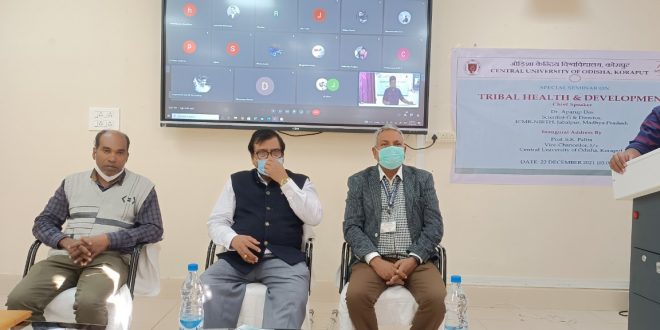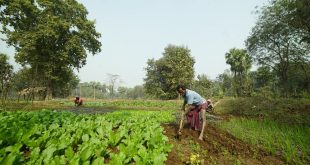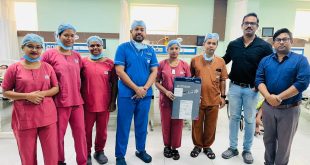In poverty index of Odisha, undivided Koraput districts is in the highest level as mentioned in the Niti Ayog report published recently, though efforts for development of the Koraput started 25 years before is a matter of concern, said, Prof. Sunil Kant Behera, eminent Professor of the Country and currently visiting Professor of the Central University of Odisha while addressing a Lecture programme on ‘SDG: An Overview and Challenges for Minimizing Income Inequality’ on 21 December 2021. He elaborated the five Ps of the Sustainable Development Goals i.e. people, planet earth, prosperity, peace and partnership to achieve the target. He said “no doubt the country is growing in many aspects but in the present globalized period the reality in the whole world is inequality. Rich become richer, the poor become poorer and the middle classes are sufferer”.
As part of the Guest Lecture Series the Central university of Odisha, Koraput organized the second Guest lecture on ‘SDG: An Overview and Challenges for Minimizing Income Inequality’ on 21 December 2021. The Vice-Chancellor of the University Prof. Sharat Kumar Palita inaugurated and presided over the programme. He highlighted various targets set on Sustainable Development Goals and what our country achieved so far.
Eminent economist and policy-planner Prof. S.N. Mishra, Dean, School of Management KIIT, Bhubaneswar delivered a lecture as the Chief Speaker on this occasion. He spoke about the historical perspective of SDG starting from Brundtland Report 1987, compared different goals of MDG-2010 and SDG-2016, SDG sub-targets including eradication of extreme poverty, improvement of social protection system ensuring equal rights to basic service and technology- good nutrition, agricultural productivity and investment on agriculture, science and technology. He said “in a liberalized world markets become free and give us free access but there is inequality in human development parameters like society, economy, justice and inequality. Although growth is there, the level of poverty has increased around the globe. To reduce inequality, he suggested that there needs to be improvement of education and up-skilling of the workforce, increase in minimum wages, higher tax on the super rich, improvement of universal health care, increase in tax on corporate and introduction of wealth tax.
Dr. Ram Shankar, Controller of Examinations of the University organized the programme and delivered the welcome address Dr. Pradosh Kumar Rath, HoD, Dept. of Journalism and Mass Communication and Dr. Minati Sahu, HoD, Dept. of Economics introduced the guests. Dr. Phagunath Bhoi, Public Relation Officer extended the vote of thanks. All HoD I/c. and faculty members participated in the programme.

 Update Odisha-Latest Odisha News I Breaking News Get latest news on Odisha, Govt. Jobs, OSSC, OPSC, Entertainment, Crime, Sports, and Education
Update Odisha-Latest Odisha News I Breaking News Get latest news on Odisha, Govt. Jobs, OSSC, OPSC, Entertainment, Crime, Sports, and Education


